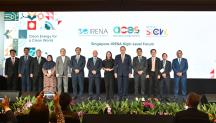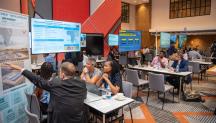.jpg?w=204&h=107&as=1&bc=ffffff&cc=1&hash=40A91B696CCC985A347BBDD2ED0E4672)
.jpg?w=201&h=105&as=1&bc=ffffff&cc=1&hash=88FB830B411372F2F0E276093289F3C5)
Effective policies vital for renewable energy scale-up
Newsletter
Effective policies are more important than subsidies for countries to scale up renewable energy on a large scale, said experts gathered ahead of the Assembly of the International Renewable Energy Agency (IRENA) in Abu Dhabi.
IRENA organised the all-day “Workshop on Renewable Energy Policies” on 12 January in collaboration with the German Federal Ministry for the Environment, Nature Conservation and Nuclear Safety. Anywhere in the world, investment in renewable power generation depends on stable regulatory frameworks, transparent planning processes and clear procedures for connection to the grid, workshop participants agreed.
“Today, renewable energy is more cost-competitive than fossil-based energy if you have the right policy framework,” said Yannick Glemarec, Director of Environmental Finance at the United Nations Development Programme (UNDP). “Renewables are the best way for oil-importing countries to save money.”
The workshop included discussions of tariff schemes, including feed-in tariffs, auctions and feed-in premiums, with presenters from Germany, Cyprus, Malaysia and South Africa sharing the experiences of those countries with various feed-in system specifications. Participants also discussed ways IRENA could assist its member countries through the Renewable Energy Policy Advisory Network (REPAN).
Another session highlighted support policies for wind energy, based on research by IRENA, the Global Wind Energy Council (GWEC) and UNDP, while a third focused on adapting renewable energy tariffs to immature energy markets in developing countries.
The policy workshop was the opening side-event of the third session of the Assembly of IRENA, with the main sessions following on 13-14 January. IRENA, established in 2011, has become the policy hub for efforts to double the share of renewables in the global energy mix by 2030 and provide sustainable energy for all.
“For me, one of the most pleasantly surprising things about this workshop was the convergence of views of all the participants, from different institutions, on what it will take to upscale renewable energy,” Mr Glemarec said. “And it isn’t subsidies. It’s to establish an enabling policy environment to reduce investment risk.”
Even in difficult economic times, governments can choose to “invest scarce public funds… to create the enabling environment to mobilise private finance” for renewable energy deployment, he added.




